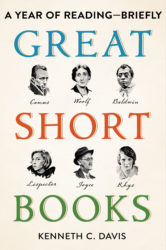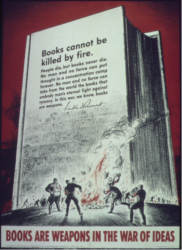It is a troubling statistic, but not a surprising one. Just look around. Everybody is on a phone.
It is a problem–and a new pandemic–that has no name. So let’s give it one — Preoccuphonia: The act of being constantly occupied, even addicted, to our smartphones. Maybe that isn’t so smart, after all.
In my new book, Great Short Books, I offer an solution to this obsession— a return to reading. Not as an escape, but as an antidote that helps mind, body, and spirit.
During the pandemic lockdown, with a limited attention span, I read 58 great short books, each approximately 200 pages or less, and by a diverse group of writers. Getting through a little more than one book per week made it “A Year of Reading—Briefly.”
What I rediscovered is that books change lives, hearts, minds, and can fire the imagination. Books convey story and story inspires us. And they can provide, as Joseph Conrad wrote, “that glimpse of truth for which you have forgotten to ask.” Reading improves our physical and psychological well-being—a fact supported by numerous studies, including a Yale study that says reading can add to your longevity.

Office of War Information, 1942, Library of Congress, Public Domain
And there is one more key element that must be underscored. Books are essential to preserving democracy. As the censorship battles continue, I believe that “Books are weapons in the War of Ideas,” the slogan of the Armed Services Editions that were provided free to U.S. military personnel during World War II. And I have no doubt: we are in the midst of a war of ideas.
I’d like to share the essential joy and value of reading books with everyone. A couple of suggestions I’d like to humbly offer:
Happy New Year to All
Here are some key organizations leading the fight against book bans and other forms of censorship:
National Coalition Against Censorship
American Library Association (ALA) Office of Intellectual Freedom (OIF)
ACLU (American Civil Liberties Union) “What is Censorship?